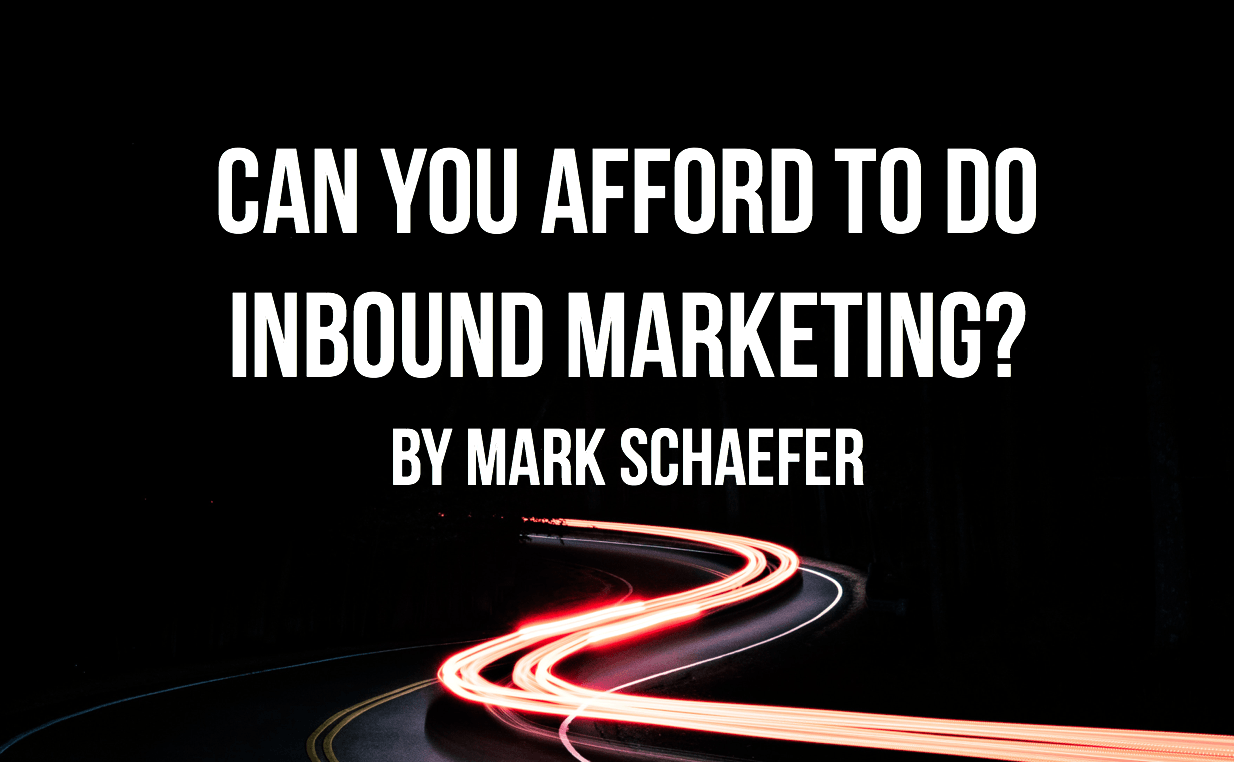
By Mark Schaefer
In a recent post entitled “Can Hubspot afford to do inbound marketing any more?” marketing strategist Louis Gudema questions whether the promise of cost-effective content-based marketing is sustainable for Hubspot and its customers.
His analysis kicks open the door on a question which isn’t getting a lot of discussion in the business world: Is inbound marketing the cost-effective strategy that has been touted by Hubspot for years?
The inbound philosophy has spawned a significant industry of partners, advisors, and content creators. The idea that inbound marketing may not work … even for Hubspot … is not going to be popular with a lot of people.
Today, let’s explore the issues raised by Louis and add to the discussion — if inbound marketing isn’t cost-effective for Hubspot, will it work for you?
The inbound marketing problem
Here’s a summary of the points Louis makes in his article:
- Hubspot’s inbound system is built on the promise of cost-effective customer acquistion. Creating high-potential leads attracted by content should theoretically be less costly than having a team of sales people pounding the streets.
- However, the company’s public data shows that their sales and marketing costs are extremely high, and getting higher. Some analysts have said these high costs have been a burden that has prevented Hubspot from ever turning a profit.
- In the last two years, Hubspot stopped releasing cost of customer acquisition information. Using publicly-available data, Louis did his own calculations to estimate that Hubspot’s cost of customer acquisition has increased by 133 percent.
- HubSpot wrote in its 2014 annual report: “We believe that customer acquisition cost, or CAC, is an indicator of the efficiency of our sales and marketing programs in acquiring new customers.” Louis hypothesizes that the company has stopped releasing this cost data because it would be embarrassing to share.
- He adds that Hubspot has built up tremendous SEO-equity with their content. The company receives about $5 million of organic search clicks each month, an evergreen asset that will deliver search traffic for a long time.
- However the search traffic is not necessarily converting into leads or sales. One customer reports that one out of every 400 inbound contacts becomes a lead.
What’s wrong with the inbound model?
If I owned a company that had more than doubled its cost of customer acquisition I would be in emergency mode. Inbound is supposed to lower customer acquisition costs, not increase them. If Hubspot can’t make their own system work, is this a marketing methodology on the bubble?
Louis hypothesizes three reasons why the Hubspot inbound marketing costs are out of control:
- They have already picked the low-hanging customer fruit. At some point the inbound technique gets “exhausted.”
- Hubspot has quietly added traditional “push” advertising and digital ads to its marketing mix.
- As competitors replicate the technique and shower the market with content, the cost of competing through content goes up and the benefits go down (Content Shock).
In addition to these ideas, I think there could be other reasons why Hubspot’s marketing costs appear to be out of control.
- First, proving the inbound philosophy through cost-efficient marketing may be less important to Hubspot right now than dominating their competitive market niche. Perhaps they are willing to spend at all costs to force an industry shake-out.
- Second, Hubspot is not a pure, sales-call-free model. The leads generated by content are turned over to a labor-intensive call center. As the economy has heated up, so have labor costs, especially in their home city of Boston. The employment cost index has risen 3 percent a year for the last three years in Boston, well above the US average. So this focus on labor intensive cold-calling in an expensive city like Boston is driving up costs.
- The idea of promoting content through social networks doesn’t work like it did a few years ago when platforms like Facebook and LinkedIn were more accommodating toward links. Today, the social networks are focused on increasing content dwell time with algorithms that discourage links that drive inbound traffic to a company site. That trend jeopardizes the core inbound strategy, and would drive up costs.
When does inbound marketing work?
I think most companies have realized by now that inbound marketing is not the easy magic bullet that had been so hyped. The reality of our rapidly-shifting world suggests that inbound marketing may not work for all companies and all markets.
Still, it does work in certain circumstances and should be considered if you are in a:
- new industry that has been under-served with content
- an industry with very few competitors
- a situation where competitors are not creating content
- a business that offers content that is significantly and sustainably different from competitors
- a market where many people are searching for content with narrow search terms
In these scenarios, you may be able to get high search rankings and significant numbers of qualified inbound leads at a reasonable cost.
You also need patience. Done well, inbound marketing takes time. So if you’re in a need for rapid lead generation and immediate sales benefits, inbound marketing would probably not be the first choice for a strategy.
I would also suggest that an alternative inbound strategy is using content to build thought leadership and relationships instead of leads for cold calls. Again, that takes time but it has been a very cost-effective strategy for me and others.
The inbound model has changed
If you’re looking at content and inbound marketing through the same lens for the past three years it might be time to get the prescription checked. The world has changed.
While it’s not entirely accurate to judge the overall potential of inbound marketing by Hubspot’s skyrocketing costs and dismal financial performance, at some point Hubspot does need to answer the Great American Question: “If you’re so smart, how come you’re not rich?”
Image marked safe for re-use by Unsplash.com